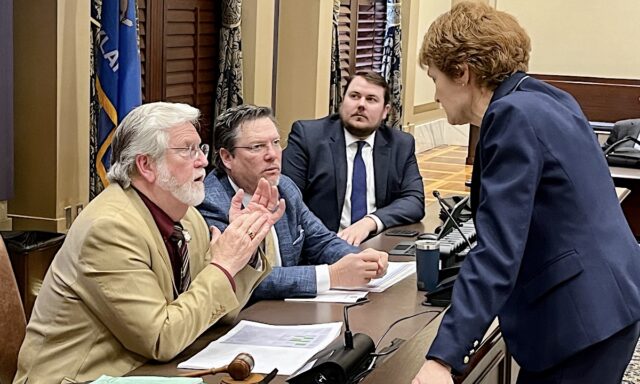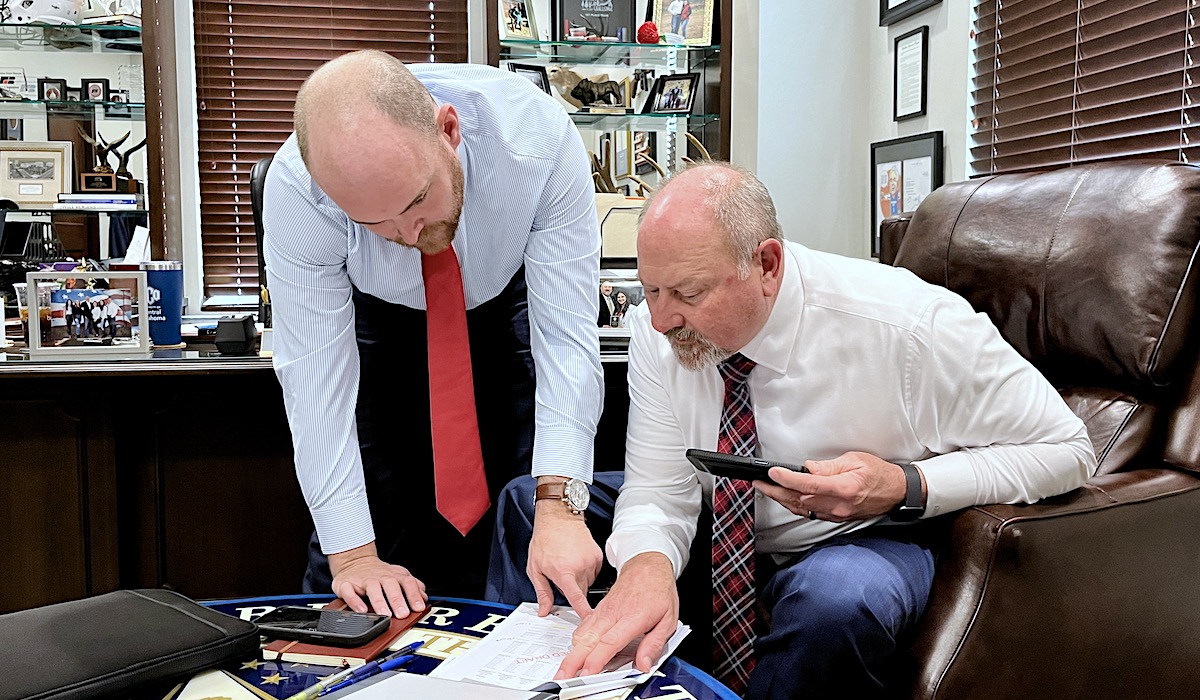
(Update: About 9:30 p.m. Thursday, March 14, the anticipated Senate budget resolution was filed as SR 31. The following article remains in its original form.)
After 50 minutes of conversation about slight changes based on advancing policy proposals, the Senate Appropriations and Budget Committee culminated its meeting this morning with a voice vote to turn a massive spreadsheet displayed on the room’s projector into a Senate budge resolution.
About two dozen senators exclaimed “aye,” and no senator said “nay.”
“A unanimous acclamation,” Chairman Roger Thompson said. “These are our beginning numbers. We are adjourned.”
The acclamation — which culminated weeks worth of committee meetings, questions and methodical considerations of individual policy proposals that carry fiscal impacts — will be crafted into a non-binding Senate resolution set for a floor vote next week as the upper chamber’s official negotiating position. At that point, Thompson said discussions with the chamber across the rotunda will begin in earnest, with House priorities considered again by the Senate Appropriations and Budget Committee and — ideally — worked into the broader framework.
“I understand there are drinking games going on about how many times I use the word ‘dynamic,'” Thompson (R-Okemah) said during Wednesday’s meeting. “But this is a dynamic process.”
Senate leaders have embarked on this unprecedented effort for fiscal transparency one year after tumultuous state budget negotiations drew frustrations from stakeholders. Throughout the first six weeks of this year’s session, House leaders have expressed skepticism about the Senate’s new process and have said their existing subcommittee process is transparent enough.
Previously on #okleg
Last month, legislators already approved elimination of the state portion of the sales tax on groceries, reducing future annualized revenue collections by about $418 million.
“I want to remind everybody that we are still in the process of doing the budget, and it is a negotiated process,” Thompson said. “These are the Senate position numbers.”
Based on the Senate’s spreadsheet of accumulated appropriation proposals, most agencies would receive either flat budgets or slight increases for Fiscal Year 2025.
A significant use of one-time funds — about $600 million — is proposed for agencies such as the Oklahoma Water Resources Board, the State Department of Education and the Oklahoma Tax Commission. The Senate is also proposing an $18.5 million one-time increase to the Department of Mental Health and Substance Abuse Services, as well as a $12.5 million increase for recurring dollars to reflect money deemed as savings under criminal justice reform meant to be redirected to mental health services under the passage of State Question 781.
According to senators’ priorities, another $600 million would go toward deferred maintenance projects at higher education institutions, state parks and other state assets. Funding long-awaited improvements to campus buildings has been a top priority for higher education leaders.
Under the Senate spreadsheet, more than $1 billion in cash — beyond statutory and constitutional reserves — would be retained for future years.
In addition, about $463 million of other funds senators intend to appropriate is unallocated in an effort to provide House members opportunities for their priorities. Of that, $166 million would be recurring revenue to spend year after year, while $297 million is additional one-time cash.
“As we begin to meet with the honorable House, we understand that their members are talking to their constituents, and they’ll have needs that we’ve not seen yet,” Thompson said. “While many of those have told me, ‘Yes, do what you want to do, we really don’t care. We’ll do what we want to do when we get (the numbers) over there,’ I have a sneaking suspicion that they’ve been watching the videos and they know the numbers real well.'”
Wallace: ‘We’re even now farther behind’

While Senate leaders appear pleased with how their new process is playing out, some House members have been less enthused and tempted to employ sarcasm when talking about their partners’ process across the rotunda.
Among lingering questions is whether the Senate and House even agree on the starting place for their respective spreadsheets, which so far have not been merged into one working document.
“The ‘transparent process’ did not include the House A&B chair or vice chair,” House Appropriations and Budget Chairman Kevin Wallace (R-Wellston) quipped Wednesday afternoon. “The budget process has always been transparent. We haven’t gotten a budget negotiation done, and to be honest with you, we’re even now farther behind, because there have been no meetings, and constitutionally that’s the only duty we have.”
Senate President Pro Tempore Greg Treat (R-OKC) argued the opposite last week during a press availability.
“We’re way ahead as far as where everyone knows what is going to be the Senate priorities in the budget,” Treat said Thursday. “Often times in this process, the incentive heretofore has been to hold the cards as close to the vest (as possible) so you didn’t get leveraged by the House or governor because they knew this was going to be an important priority. We prioritized sunshine over leverage in this issue.”
Wallace said the Senate’s new process has been “entertainment to watch in the building.”
Asked about rumors the House might release some sort of budget spreadsheet of its own, Wallace declined to comment.
He did, however, address the concept of the Senate leaving about $463 million of funds unallocated on its spreadsheet for House consideration
“We all get elected the same way,” Wallace said. “So just do the math on that, and I find it interesting that any chamber would think that they can control 95 percent of it and say, ‘Hey, we’re willing to negotiate with you on 5 percent.'”
But Senate Appropriations and Budget Vice Chairman Chuck Hall (R-Perry) said senators realize the House has asks and priorities.
“This gives us an opportunity to address those. But I think the most important thing is that unlike in previous years, when the House has a request that is different than what we have in our resolution, then that difference will be discussed in a public venue in an appropriations (committee) meeting. What do we want to do? Do we want to honor that request? And do we have the reoccurring funds or the one-time funds to be able to do that? Or do we not want to honor that request?”
Asked about the Senate’s spreadsheet and looming resolution, House Majority Floor Leader Jon Echols laughed.
“I don’t have any comment on the Senate’s budget process,” said Echols (R-OKC).
Hall said “an enormous amount of attention has been given to transparency.”
“The way that our subcommittee chairs have worked so hard and have been so engaged in this process from start to finish I think will pay dividends in future legislatures on how a budget should be presented, discussed and debated,” Hall said. “In the public eye, I think that brings a lot of value to the process and instills confidence in the budget process.”
Senate Minority Leader Kay Floyd (D-OKC) agreed.
“I think that we’re accomplishing the open and transparent, and I think that’s really great for the state. There’s a lot of input,” Floyd said. “And I’m very grateful that Sen. Treat and Sen. Thompson had put this together and stuck with it. I think it’s going to be a really good thing for the state.”
Wallace said one concern about the lack of meetings between himself and Thompson so far relates to agency requests for supplemental appropriations. At least 10 agencies have requested at least $40 million of additional funding to support their budgets for Fiscal Year 2024, which concludes June 30.
During Wednesday’s committee hearing, Thompson said some supplemental requests, such as funding for the Attorney General’s Office and the District Attorneys Council, have been included in the Senate’s spreadsheet that will be turned into a resolution by Monday.
Wallace scoffed at the notion.
“A resolution definitely doesn’t fund an agency or give a supplemental (appropriation),” Wallace said.
(Correction: This article was updated at 2:30 p.m. Thursday, March 14, to correct reference to the types of Oklahoma Department of Mental Health and Substance Abuse Services funding expected to be included in the Senate budget resolution.)





















